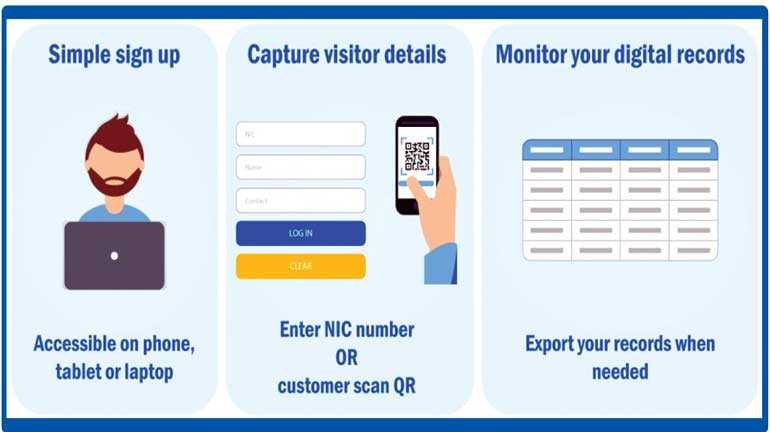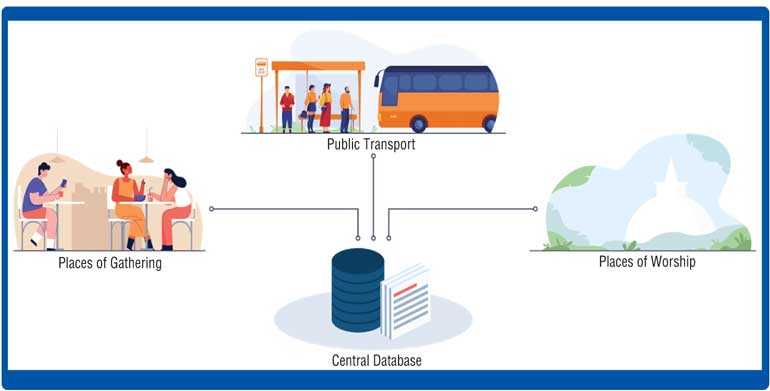Monday Feb 16, 2026
Monday Feb 16, 2026
Tuesday, 23 June 2020 01:33 - - {{hitsCtrl.values.hits}}


COVID-19 is the worst pandemic that our generation has seen, and with its high contagiousness it has been identified that the best solution for keeping mortality rates down is by proper identification and quarantining of any persons who contracted the virus allowing for a safer society.
Realising this need we were inspired to develop a comprehensive solution which could be deployed with ease. The platform is an easy to use web application to serve as a digital register for businesses during the COVID-19 period for regulatory compliance. The responsive web app works across devices to securely save customer visit data for COVID-19 compliance and reporting purposes. The countries which are winning the battle against the pandemic are doing so by using reliable data at scale.
“Yesterday I walked into a pub, so these guys are now being mandated by the Government to take the information of people who are coming into the pub if in case some tested positive they are supposed to quarantine that entire lot who was in the pub. This is just one facility in Colombo, now multiply that problem at scale, who is going to gather this data, and who is going to assess, now this guy had positive symptoms and how are you going to do real tracking of this individual. It is a problem about data.”
This was a statement made by a CIO at a leading organisation on an online public webinar held recently in Sri Lanka. These words served as the trigger for the idea to develop a solution to answer this timely question for the team who were eagerly looking for an opportunity to assist Sri Lanka during this crisis ridden pandemic situation.
Platform URL: https://staysafelk.com/
How it works
In developing the app, the team analysed how countries like New Zealand, Singapore, and China used technology to overcome the problems posed by the COVID-19 pandemic and designed their solution based on the insights derived. The app is positioned as a unique solution designed based on an understanding of the Sri Lankan user, and to encourage the usability of the application. This app delegates the responsibility and option for both owners of business entities and individuals to make this exercise a success.
This app helps business entities or merchants to create their register of the visitors and serves as a digital register for recording the footfall of customers to their stores. The merchant can quickly sign up and generate their unique QR code, which could be displayed at the entrance. The vendor can track the time that the person walks in and walks out by entering the NIC at the given time or requesting the customer to scan the QR.
Data that was collected by the vendor is given solely to him only and will not be shared with any other persons (except on request by respective government authorities). This data can be used to track the locations visited and time of visitation by any persons who contracted the COVID-19 virus as well as other persons who also visited the same locations within the said time by simply querying the geo-spatial database and the relevant persons can be alerted to carry out self quarantine or to reach out to relevant medical institutions.
The back-end, data collection and analysis
The team believes that the data collected by the app will ultimately result in a reliable spatio-temporal system of records. Eventually, in an outbreak, it would be much easier to track down the infected places the person had visited and who were exposed.
Also, a score could be derived for both the merchants and individuals who visit their stores. The score would be shown on the dashboard for the merchant when entering the NIC, and likewise the individual will get the score of the merchant when the person scans the QR. In an outbreak, the individuals can be notified via SMS to self-quarantine in case they are exposed to infected individuals.
One of the key focuses has been the security and governance of data. Data is secured in transit by connection over TLS via encrypted channels and the data is also encrypted and stored at rest to ensure compliance with standards. Cloud infrastructure which complies with data governance standards such as HIPAA, GDPR and PCI-DSS are used for the purposes of infrastructure for the application.
The team comprises Shanaka Perera who is currently pursuing his PhD in Data Science in the UK, Nuzhi Meyen who is a consultant in the tech space, Suraj Adikaram who holds a bachelors from University of Moratuwa and Kanishka Bandara who is pursuing his bachelor’s degree. Shanaka and Nuzhi are engaged in the data science and engineering aspect while Suraj and Kanishka look into the development and product roadmap side.
Use cases
The use cases for the application are diverse and some of them are as follows:
Plans
The motivation of the team in building the app is to help Sri Lanka by using their knowledge to contribute to limiting the fallout from the COVID-19 pandemic. The app will be free for the business with small footfalls and for places of worship. However, a nominal subscription fee will be charged from businesses for the maintenance of the service.
Future steps in the planned product roadmap include adding a feature to allow merchants to scan the National Identity Card (NIC) to make it convenient to capture the details and to develop a mobile app that allows individuals to keep track of the areas they have visited and inform them about their vulnerability towards the disease through the gathered data. Also ultimately to integrate the system with the related Government departments who are at the forefront of the COVID-19 battle.